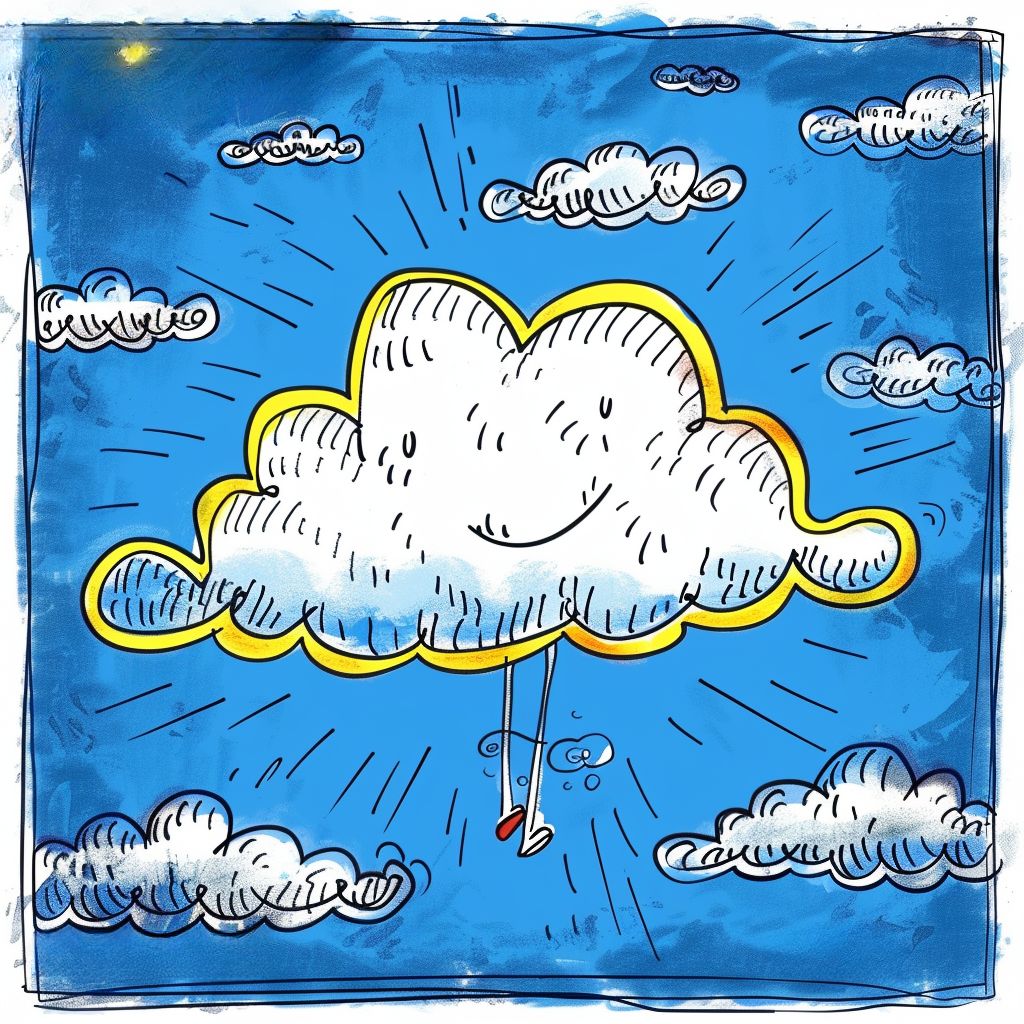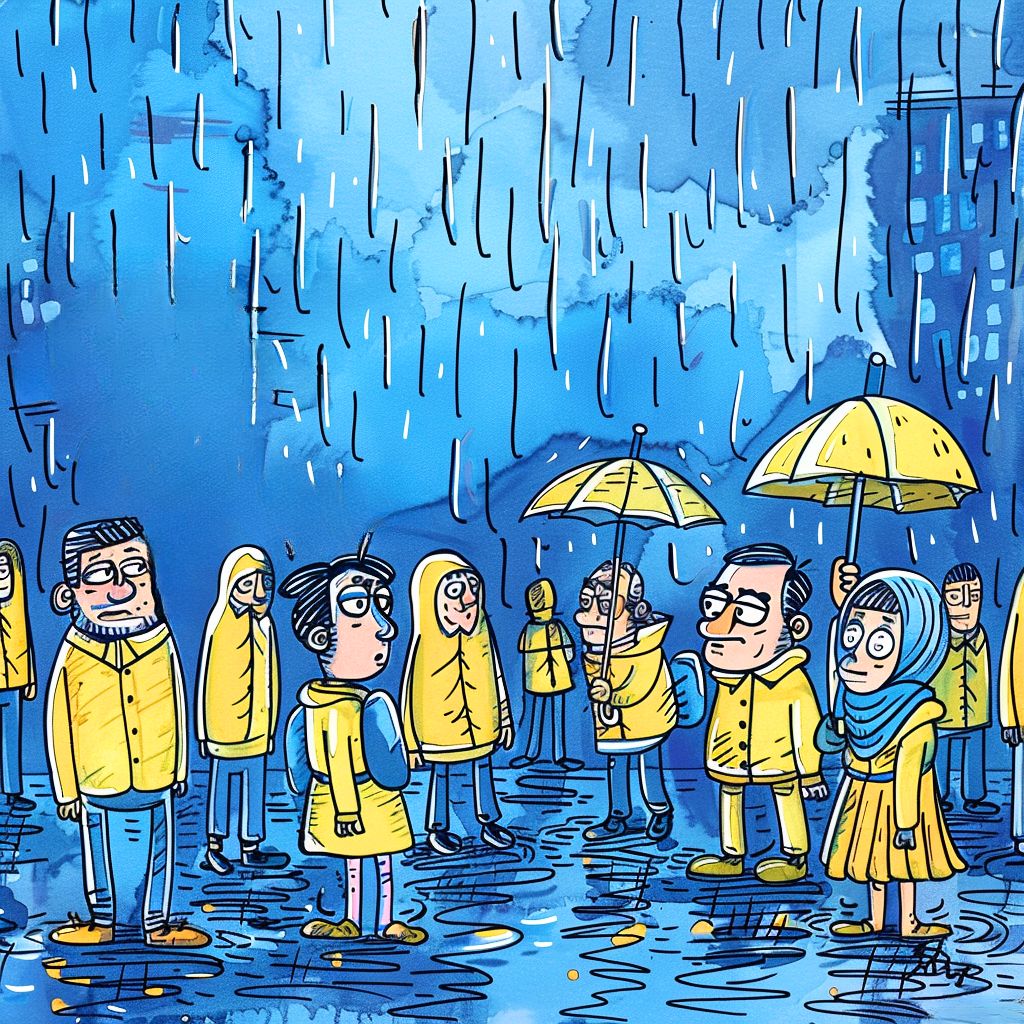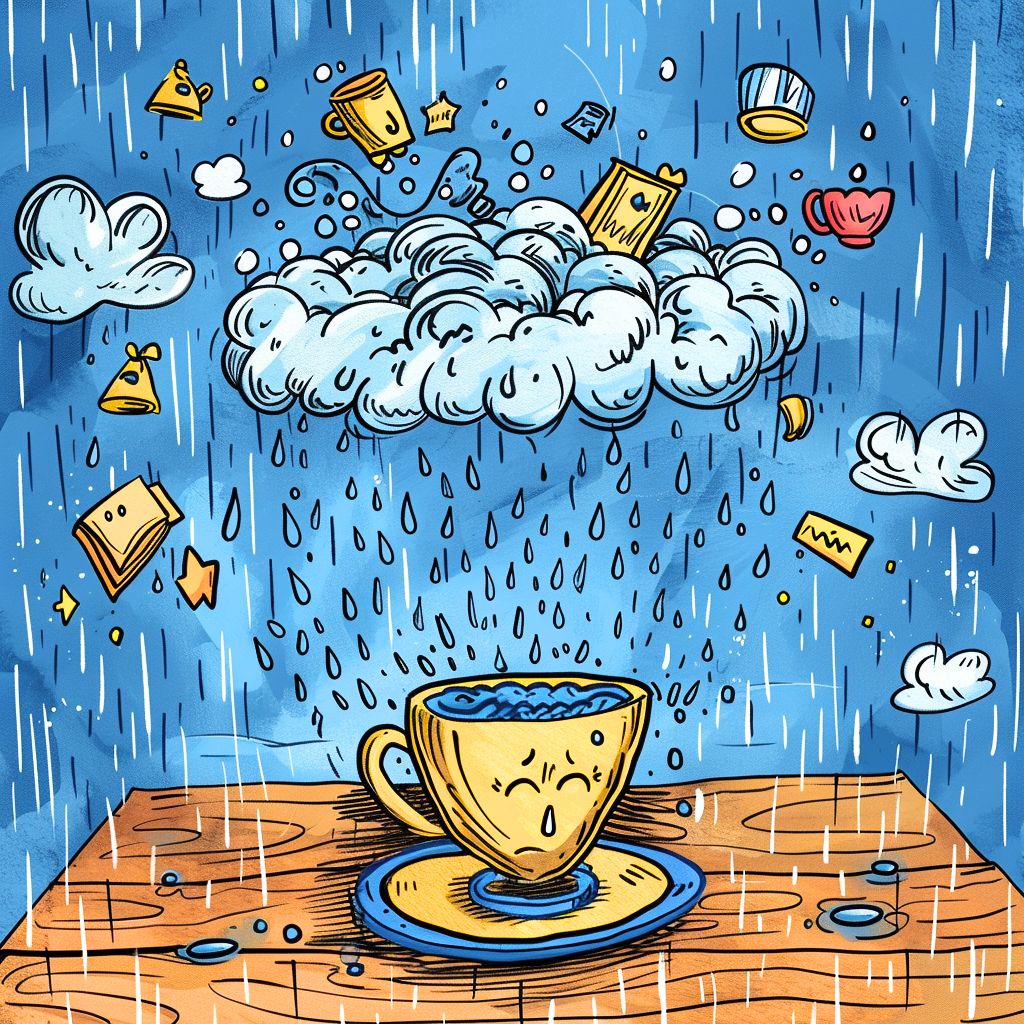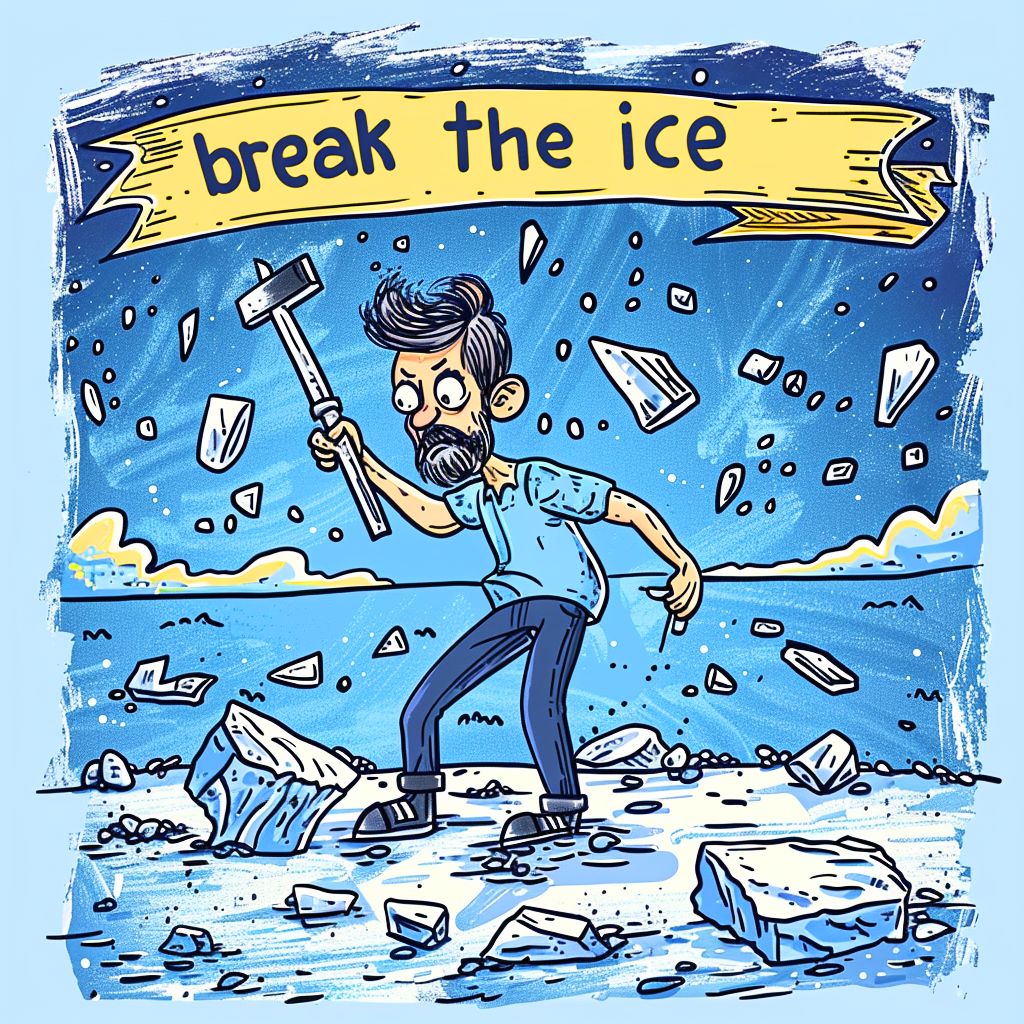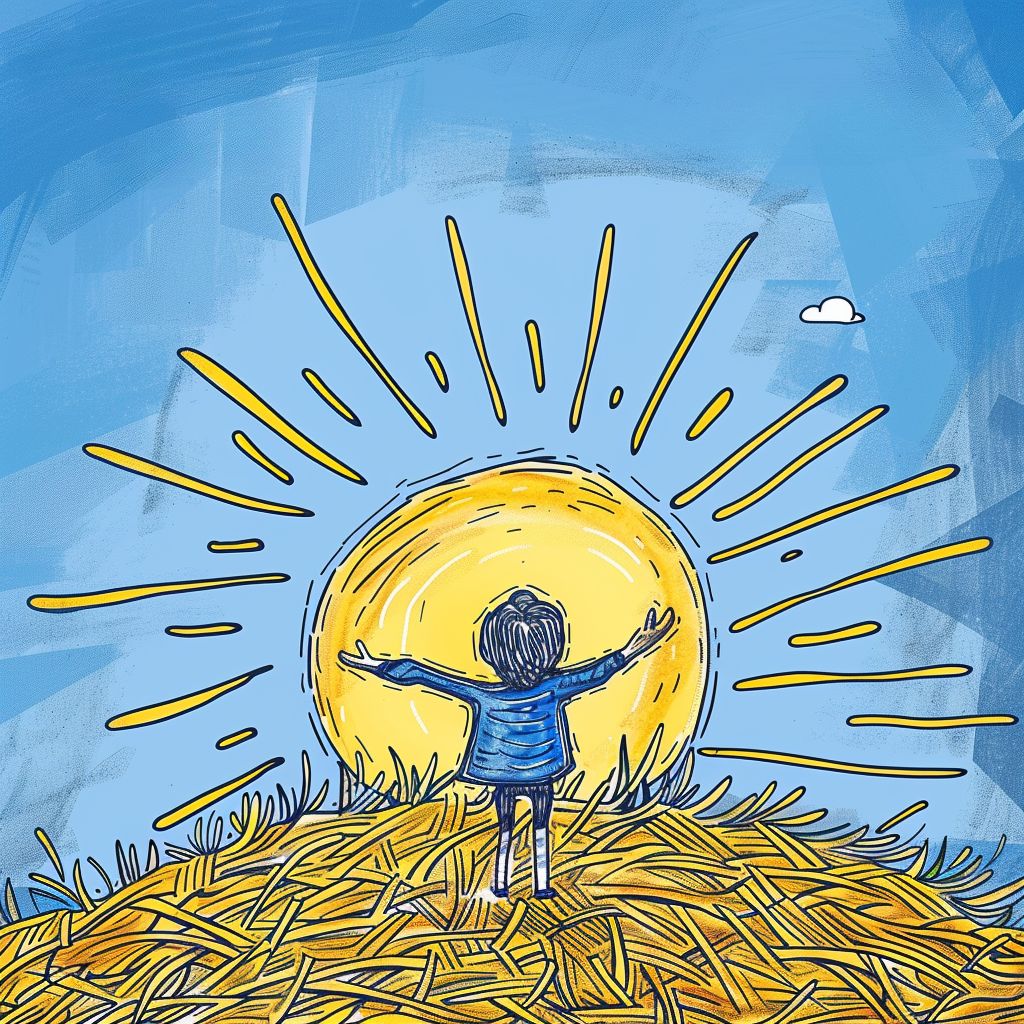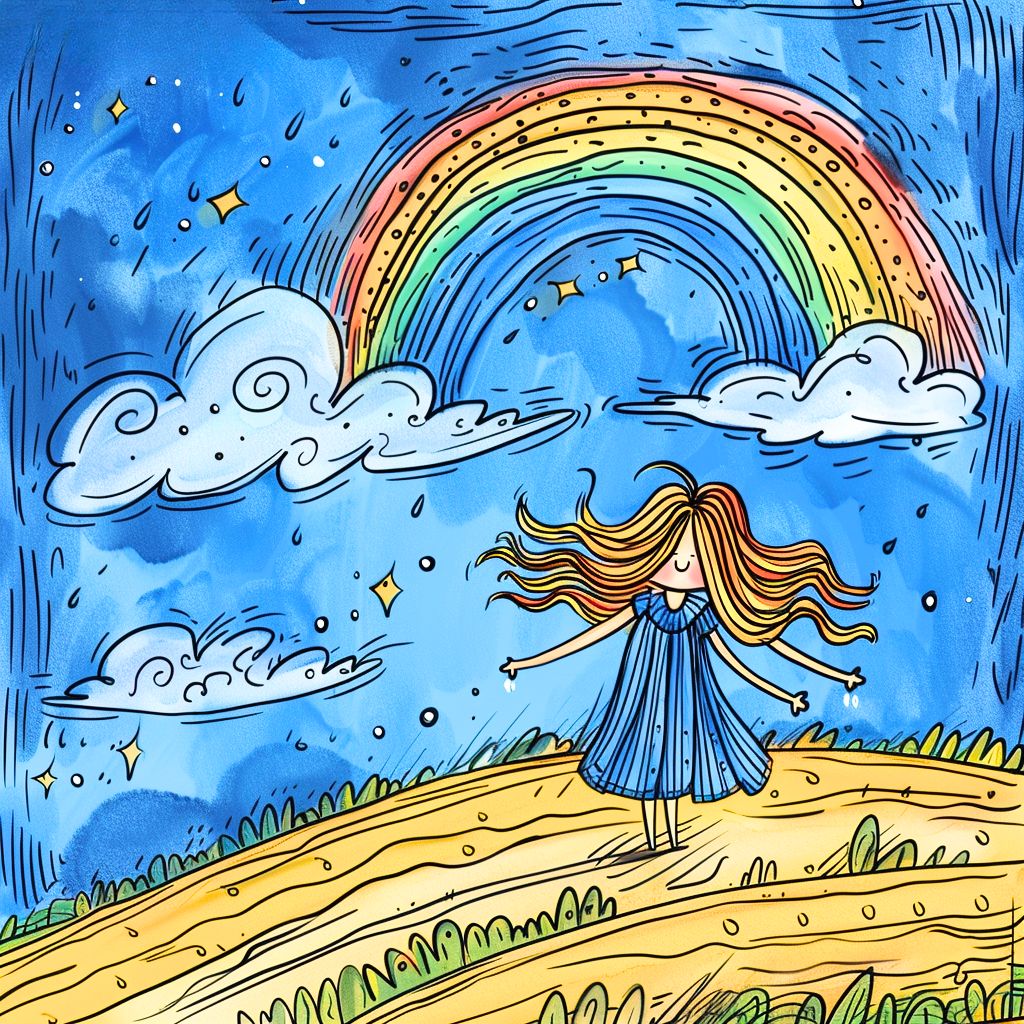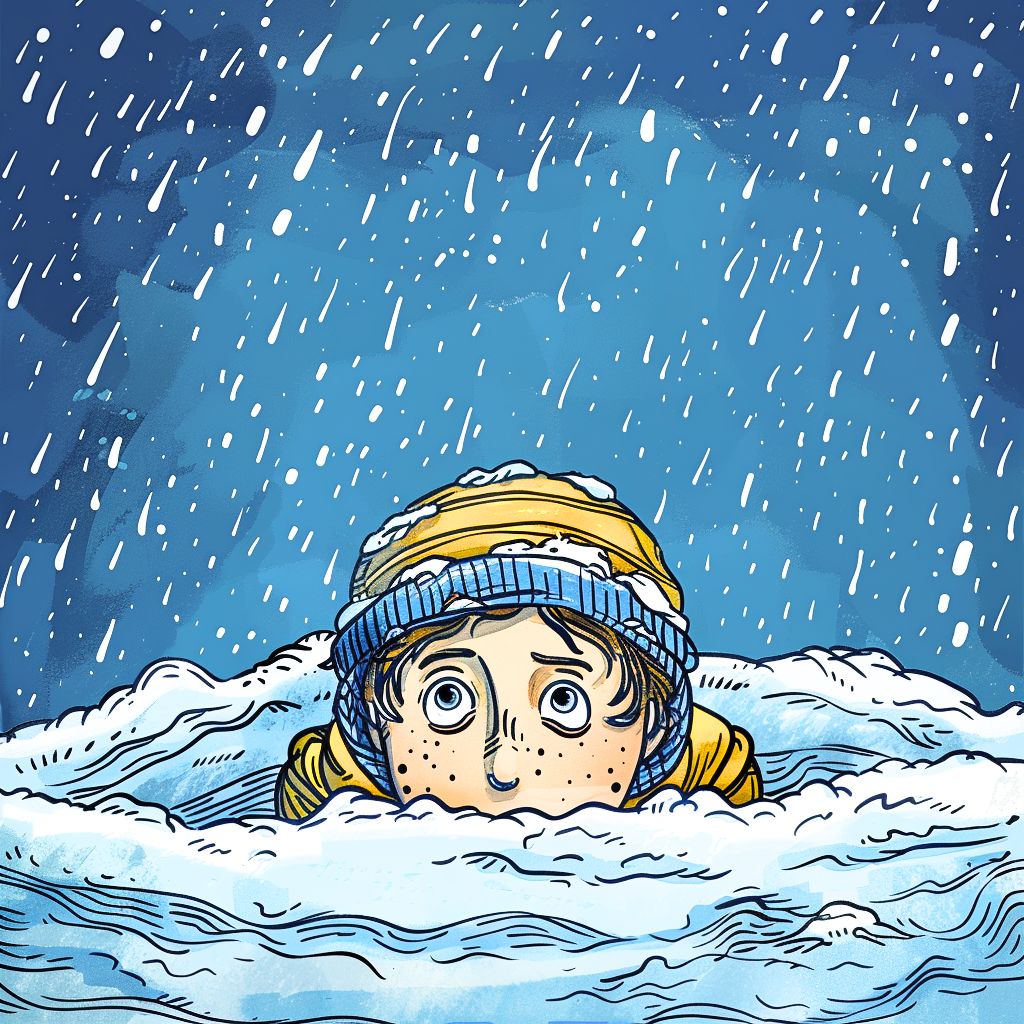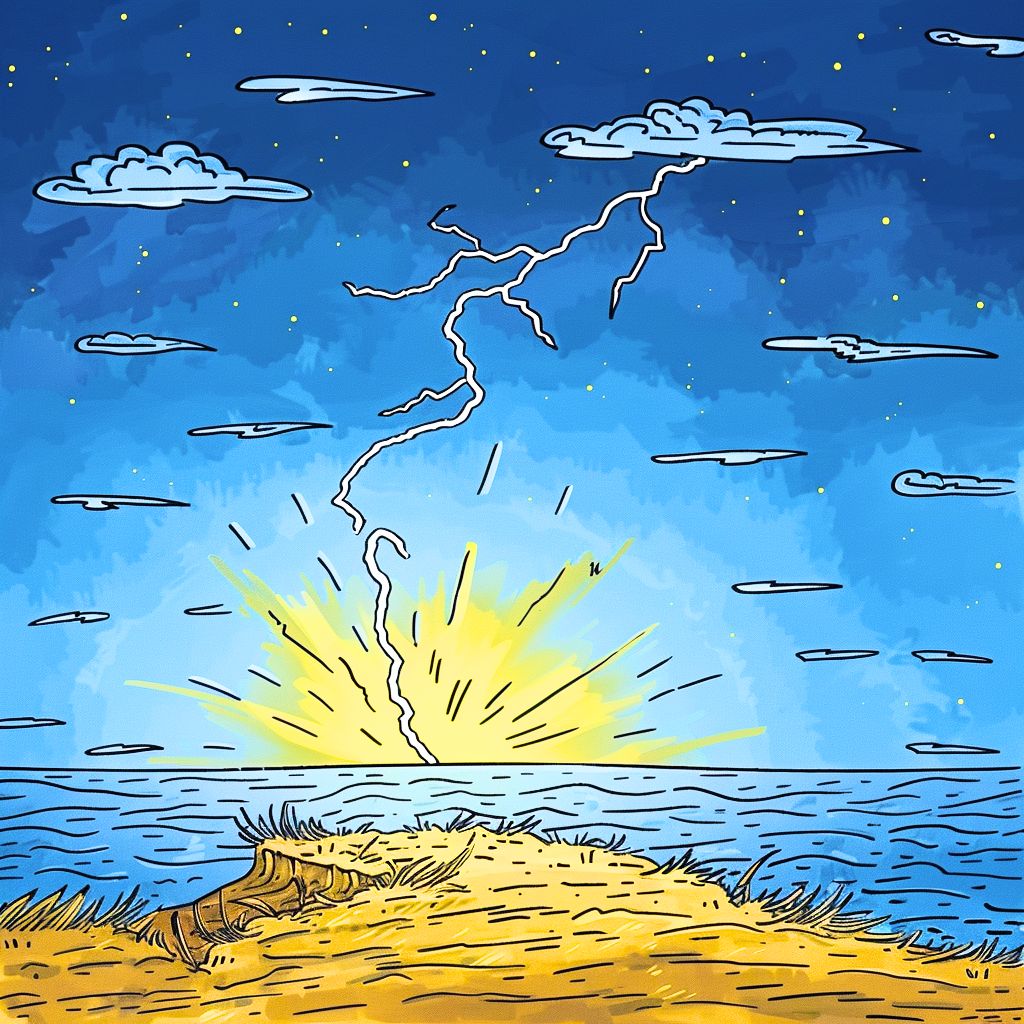Want to spice up your chats? Nature-inspired idioms are your go-to.
They’re fun, relatable, and perfect for any conversation. Let’s explore some that will add charm and humor to your everyday talks.
Enough said. Time to get directly to it, shall we?
1. Under the weather
The idiom “Under the weather” is often used in casual chats, like when you’re talking with friends or family, to say you’re feeling kinda crappy, usually because you’re sick or just plain worn out.
It’s mostly thrown around in a sympathetic, “I feel you” kind of way, letting people know you’re not on your A-game but without the dramatic details.
This expression humorously compares feeling unwell to dealing with bad weather, as if your health is experiencing its own little stormy day.
Its origins trace back to sailors who’d go below deck (literally under the weather) to recover from seasickness caused by choppy waters. Ahoy, matey, pass the ginger ale!
Using this idiom adds a sprinkle of humor to the conversation, making your misery seem a tad more bearable and maybe even earning you a pity laugh.
It captures the spirit of shared empathy and the universal “meh” feeling that everyone gets sometimes, reinforcing that it’s totally okay to take a break when life feels like a raincloud.
Example 1: When Jane skipped the gym, she texted her workout buddy, “I’m feeling a bit under the weather today, might just stay in bed and binge-watch shows instead.”
Example 2: After sneezing for the tenth time, Tom groaned, “I think I’m under the weather. This cold is really raining on my parade.”
2. Every cloud has a silver lining
The idiom “Every cloud has a silver lining” is often used in everyday conversations, especially when you’re trying to cheer someone up or find the bright side of a crummy situation.
It’s mostly thrown out there in a positive, “Hey, it’s not all bad” kind of way, highlighting that even in the worst times, there’s something good waiting to be found.
This expression humorously likens life’s troubles to dark clouds but with a shiny edge, suggesting there’s always a glimmer of hope if you squint hard enough.
Its origins trace back to the natural phenomenon where the sun peeks out from behind a cloud, creating a glowing outline. It is nature’s way of saying, “Hang in there!”
Using this idiom injects a dose of optimism into the conversation, encouraging a smile and a “yeah, I guess so” nod from anyone feeling down.
“Every cloud has a silver lining” reflects the spirit of resilience and the shared understanding that no matter how stormy things get, there’s always a bit of light on the horizon.
Example 1: When Sally lost her job, her friend said, “Hey, every cloud has a silver lining. Now you have time to start that blog finally!”
Example 2: After spilling coffee all over himself, Jim sighed, “Well, every cloud has a silver lining. At least now I can leave work early and change.”
3. Rain on someone’s parade
The idiom “Rain on someone’s parade” is often used in informal settings, like when chatting with friends or family, to describe ruining someone’s good mood or plans with bad news or negative comments.
It’s mostly thrown around in a playful, “buzzkill alert” kind of way, pointing out when an untimely downpour of reality is squashing someone’s joy.
This expression humorously likens spoiling someone’s fun to a sudden rainstorm crashing a lively parade, leaving everyone soggy and grumpy.
Its origins trace back to the imagery of an actual parade being drenched by rain, making all the festive fun turn into a wet mess. Talk about a party pooper!
Using this idiom adds a touch of drama to the conversation, making the act of spoiling fun seem a bit more theatrical and less harsh.
It captures the essence of shared frustration and the universal understanding that nobody likes their excitement doused by a cold shower of negativity.
Example 1: When Mark was excited about his vacation plans, Sarah said, “I hate to rain on your parade, but did you check the weather forecast? It’s supposed to storm all week.”
Example 2: After Jenny excitedly announced her new puppy, Tom said, “Not to rain on your parade, but puppies chew everything. Good luck with your shoes!”
Ready for the next idiom?
4. Calm before the storm
The idiom “The calm before the storm” is often used in casual conversations, especially when there’s a weirdly peaceful moment just before chaos erupts.
It’s mostly used in a knowing, “brace yourself” kind of way, highlighting the eerie quietness that typically precedes a big commotion or trouble.
This expression humorously likens a peaceful period to the tranquil time just before a storm hits, suggesting that something big (and probably messy) is about to go down.
Its origins trace back to weather patterns where a lull in activity often occurs right before a storm, making everyone go, “Uh-oh, something’s coming.”
Using this idiom adds a bit of suspense and drama to the conversation, making the anticipation of trouble seem like a scene from a movie.
It captures the essence of shared anxiety and the universal understanding that when things are too quiet, something will likely explode into action.
Example 1: When the office was unusually quiet, John said, “Enjoy the calm before the storm. The boss will be back from lunch soon with those project updates.” Example 2: After the kids finished their homework and the house was oddly silent, Mom remarked, “This must be the calm before the storm. They’re probably planning something.”
5. A storm in a teacup
The idiom “A storm in a teacup” is often used in informal settings, like when chatting with friends or family, to describe a big fuss over something trivial.
It’s mostly used in a light-hearted, “chill out” kind of way, pointing out that someone is making a mountain out of a molehill.
This expression humorously likens an overblown reaction to a storm confined to a tiny teacup, suggesting that the drama is way out of proportion to the issue.
Its origins trace back to various versions of similar phrases, all emphasizing that some people can turn the smallest problem into a full-blown crisis.
Using this idiom adds a dash of humor to the conversation, making the exaggerated reaction seem more ridiculous and less serious.
It captures the essence of shared amusement and the universal understanding that people sometimes need to take a deep breath and relax.
Example 1: When Karen panicked over a minor typo in her email, John said, “Calm down, it’s just a storm in a teacup. No one’s going to notice.”
Example 2: After Tom got worked up about a tiny scratch on his car, Lisa laughed, “Don’t make a storm in a teacup. It’s barely visible!”
6. Break the ice
The idiom “Break the ice” is often used in informal settings, like when you’re trying to start a conversation with new people or lighten the mood in a group.
It’s mostly used in a friendly, “let’s get this party started” kind of way, signaling the start of interaction to ease any awkwardness.
This expression humorously likens starting a conversation to breaking a layer of ice, suggesting you’re making things flow smoothly.
Its origins trace back to ships breaking through ice to create a path, making it easier for others to follow. Think of it as social ice-breaking!
Using this idiom injects some playfulness into the situation, making the act of starting conversations seem more like a fun challenge than a nerve-wracking ordeal.
It captures the spirit of camaraderie and the universal understanding that starting things off on a friendly note makes everything better.
Example 1: At the beginning of the meeting, Dave told a funny story to break the ice and get everyone laughing.
Example 2: When meeting his girlfriend’s parents for the first time, Mike broke the ice by mentioning their shared love for dogs.
PS: We have also covered this idiom in our article on “English Must-Know Idioms” right here. Give it a go to test yourself and see if you know all of these highly popular idioms!
7. Get wind of
The idiom “Get wind of” is often used in informal settings, like when gossiping with friends or sharing secretive news, to describe learning about something indirectly.
It’s mostly used in a curious, “did you hear?” kind of way, highlighting how information has been discovered, often through the grapevine.
This expression humorously likens discovering news to catching a whiff of something carried by the wind, suggesting that the information has floated over to you.
Its origins trace back to the idea of hunters and sailors being able to detect things from afar, thanks to the wind carrying scents or sounds.
Using this idiom adds a touch of intrigue to the conversation, making the act of hearing news seem more mysterious and exciting.
It captures the spirit of shared curiosity and the universal understanding that sometimes news travels in unexpected ways.
Example 1: When Sarah got wind of the surprise party being planned for her, she couldn’t hide her excitement.
Example 2: After the rumor about a company merger started spreading, employees began whispering, “Did you get wind of the big news?”
8. It’s a breeze
The idiom “It’s a breeze” is often used in informal settings, like when you’re chatting with friends or family, to describe something that’s super easy to do.
It’s mostly used in a laid-back, “piece of cake” kind of way, emphasizing that whatever you’re talking about requires minimal effort.
This expression humorously likens an easy task to a gentle breeze, suggesting it’s as simple and effortless as a light wind on a sunny day.
Its origins likely stem from the pleasant and uncomplicated nature of a breeze, making it a perfect metaphor for anything that doesn’t take much work.
Using this idiom adds a touch of casual confidence to the conversation, making you sound like a pro who can easily handle things.
It captures the essence of shared ease and the universal understanding that some things in life really aren’t that complicated.
Example 1: When asked about the math test, John shrugged and said, “Don’t worry, it’s a breeze. You’ll ace it.”
Example 2: After assembling the new bookshelf in record time, Karen smiled and declared, “That was a breeze! What’s next?”
9. Take a rain check
The idiom “Take a rain check” is often used in informal settings, like when you’re talking with friends or family, to politely postpone or reschedule plans.
It’s mostly used in a friendly, “can’t do it now but let’s do it later” kind of way, signaling that you’re still interested, just not at the moment.
This expression humorously likens rescheduling to accepting a rain check ticket for a future event, suggesting you’ll take a rain date for the fun.
Its origins trace back to baseball games, where a “rain check” was a ticket given to spectators when a game was postponed due to rain, allowing them to return another day.
Using this idiom adds a touch of politeness and flexibility to the conversation, making the act of postponing seem more like a promise for future fun rather than a letdown.
It captures the spirit of shared understanding and the universal idea that sometimes, life just happens and plans need a little adjustment.
Example 1: When invited to dinner, Mike said, “I’m swamped with work tonight. Can I take a rain check?”
Example 2: After realizing she double-booked, Jane told her friend, “I’ll have to take a rain check on our movie night. How about next weekend?
10. Make hay while the sun shines
The idiom “Make hay while the sun shines” is often used in informal settings, especially when giving advice or urging someone to take advantage of a good situation.
It’s mostly used in a proactive, “seize the day” kind of way, highlighting the importance of acting when conditions are favorable.
This expression humorously likens taking advantage of good opportunities to farmers making hay when the weather is perfect, suggesting that you should get things done while you can.
Its origins trace back to agriculture, where good weather was essential for haymaking, and any delay could mean losing the crop to bad weather.
Using this idiom adds a touch of urgency and encouragement to the conversation, making the act of seizing opportunities seem more immediate and rewarding.
It captures the essence of shared wisdom and the universal understanding that good times don’t last forever, so it’s best to act quickly.
Example 1: When the stock market boomed, Paul’s friend advised, “Invest now and make hay while the sun shines!”
Example 2: After getting a big bonus, Sarah decided to make hay while the sun shone and booked her dream vacation.
11. Chasing Rainbows
The idiom “Chasing rainbows” is often used in informal settings, like when you’re chatting with friends or family, to describe pursuing something that’s unrealistic or unattainable.
It’s mostly used in a playful, “dream on” kind of way, highlighting the futility of going after something that’s as elusive as a rainbow’s end.
This expression humorously likens the pursuit of impossible goals to chasing after a rainbow, suggesting that no matter how fast you run, you’ll never catch it.
Its origins come from the magical and unreachable nature of rainbows, which always seem close but are actually out of reach.
Using this idiom adds a whimsical touch to the conversation, making the act of pursuing impossible dreams seem more lighthearted and less disappointing.
It captures the spirit of shared skepticism and the universal understanding that some goals are just too far-fetched to be taken seriously.
Example 1: When Jake talked about winning the lottery to solve all his problems, his friend said, “Stop chasing rainbows and start saving money.”
Example 2: After hearing about her brother’s plan to become a rock star with no musical talent, Lisa sighed, “He’s always chasing rainbows.”
12. Snowed under
The idiom “Snowed under” is often used in informal settings, like when talking with friends or coworkers, to describe being overwhelmed with too much work or too many responsibilities.
It’s mostly used in a sympathetic, “I feel your pain” kind of way, emphasizing how buried you are under tasks and commitments.
This expression humorously likens being overwhelmed to being buried in snow, suggesting that you’re so swamped that you can barely dig yourself out.
Its origins likely come from the imagery of heavy snowfall covering everything, making it hard to move or do anything until you dig out.
Using this idiom adds a touch of exaggeration and humor to the conversation, making the overwhelming situation seem more relatable and a bit less daunting.
It captures the essence of shared struggle and the universal understanding that sometimes, life just piles on more than you can handle.
Example 1: When asked to join a new project, Lisa groaned, “I’d love to help, but I’m snowed under with deadlines right now.”
Example 2: After seeing the stack of paperwork on his desk, Mark exclaimed, “I’m completely snowed under! When will it end?”
13. Through the grapevine
The idiom “Through the grapevine” is often used in informal settings, like when you’re gossiping with friends or sharing news you’ve heard indirectly, to describe learning something via rumors or unofficial sources.
It’s mostly used in a curious, “guess what I heard” kind of way, highlighting how information travels through informal networks.
This expression humorously likens the spread of information to a grapevine, suggesting that news winds its way through various people before reaching you.
Its origins trace back to the days of early telecommunication when lines looked like grapevines. The image also evokes the image of how grapevines twist and spread, just like rumors.
Using this idiom adds a playful touch to the conversation, making the act of sharing rumors seem more fun and less serious.
It captures the spirit of shared curiosity and the universal understanding that sometimes, the juiciest news comes from the least official sources.
Example 1: When she heard about the office party, Jill said, “I heard through the grapevine that it’s going to be a surprise.”
Example 2: After learning about a friend’s promotion, Tom exclaimed, “I discovered through the grapevine that you got the job! Congrats!”
14. Breath of fresh air
The idiom “A breath of fresh air” is often used in informal settings, like when you’re chatting with friends or family, to describe someone or something that is refreshingly new and different.
It’s mostly used in a complimentary, “wow, this is nice” kind of way, highlighting how the person or thing stands out from the usual routine.
This expression humorously likens the welcome change to the invigorating feeling of fresh air, suggesting it brings a sense of relief and revitalization.
Its origins come from the literal feeling of stepping outside into clean, fresh air, especially after being in a stuffy or unpleasant environment.
Using this idiom adds a touch of positivity to the conversation, making the new experience seem even more delightful and appreciated.
It captures the essence of shared enjoyment and the universal understanding that everyone appreciates a refreshing change from the norm.
Example 1: When the new teacher introduced creative activities, the students said, “She’s a breath of fresh air in our boring schedule.”
Example 2: After hearing his friend’s innovative idea, Jake exclaimed, “Your suggestion is a breath of fresh air. Let’s try it!”
15. Bolt from the blue
The idiom “Bolt from the blue” is often used in informal settings, like when you’re talking with friends or family, to describe something surprising or unexpected that happens suddenly.
It’s mostly used in a “whoa, I didn’t see that coming” way, highlighting the shock or surprise of the event.
This expression humorously likens the unexpected event to a sudden lightning bolt out of a clear blue sky, suggesting it comes without any warning.
Its origins trace back to the dramatic and startling nature of lightning appearing out of nowhere on a seemingly clear day.
Using this idiom adds a touch of drama to the conversation, making the surprise seem even more shocking and noteworthy.
It captures the essence of shared astonishment and the universal understanding that life sometimes throws curveballs when we least expect them.
Example 1: When Sarah announced her sudden engagement, it was a bolt from the blue for all her friends.
Example 2: After hearing about the unexpected company merger, Tom exclaimed, “That news is a real bolt from the blue!”

Hey fellow Linguaholics! It’s me, Marcel. I am the proud owner of linguaholic.com. Languages have always been my passion and I have studied Linguistics, Computational Linguistics and Sinology at the University of Zurich. It is my utmost pleasure to share with all of you guys what I know about languages and linguistics in general.



